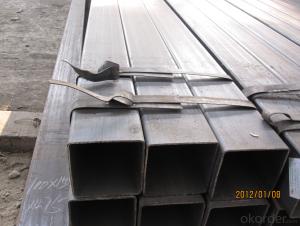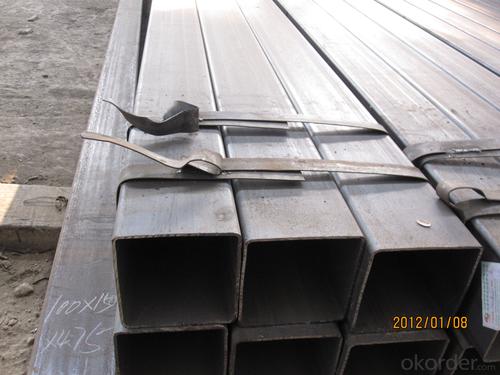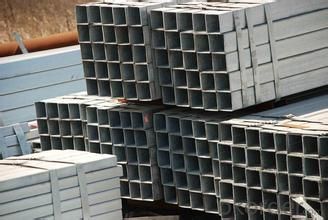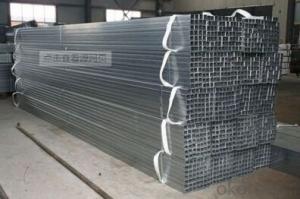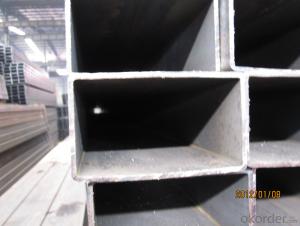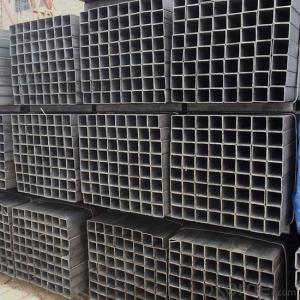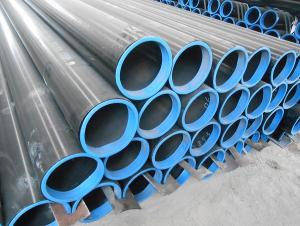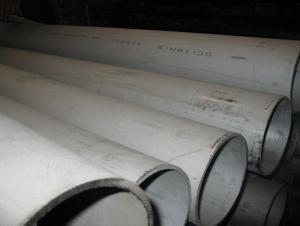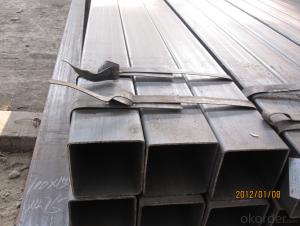Rectangular Hot Rolled Steel Pipe
- Loading Port:
- China Main Port
- Payment Terms:
- TT or LC
- Min Order Qty:
- -
- Supply Capability:
- -
OKorder Service Pledge
OKorder Financial Service
You Might Also Like
Quick Details
| Thickness: | 1.0 - 35 mm | Section Shape: | Square | Outer Diameter: | 20*20-600*600 |
| Place of Origin: | Shandong China (Mainland) | Secondary Or Not: | Non-secondary | Application: | Structure Pipe |
| Technique: | Cold Rolled | Certification: | CE | Surface Treatment: | oil,paint |
| Special Pipe: | Thick Wall Pipe | Alloy Or Not: | Non-alloy | Name: | Square Hollow Steel Pipe/Tube |
| Shape: | Square/Rectangular | Yield Strength: | 360-380Mpa | Tensile Strength: | 560-580Mpa |
| Elongation: | 24-28% | Bend Test: | Qualified | Impact Value: | V-notch |
| Grade: | 20#,45#,16Mn,A210,St45,Q235,Q345,Q195,Q215,10#-45#,A53-A369,ST35-ST52,Q195-Q345 | Standard: | JIS G3465-2006,JIS G3466,GB/T 3094 |
Specifications
1.OD:15X15-800X800MM,20X30--600X800MM
2.Thick.:1.0--35.0MM
FAQ of Hollow Section
①How is the quality of your products?
Our products are manufactured strictly according to national and internaional standard, and we take a test
on every pipe before delivered out. If you want see our quality certifications and all kinds of testing report, please just ask us for it.
Guaranteed: If products’ quality don’t accord to discription as we give or the promise before you place order, we promise 100% refund.
②How about price?
Yes, we are factory and be able to give you lowest price below market one, and we have a policy that “ for saving time and absolutely honest business attitude, we quote as lowest as possible for any customer, and discount can be given according to quantity”,if you like bargain and factory price is not low enough as you think, just don’t waste your time.Please trust the quotation we would give you, it is professional one.
③Why should you chose us?
Chose happens because of quality, then price, We can give you both.Additionally, we can also offer professional products inquiry, products knowledge train(for agents), smooth goods delivery, exellent customer solution proposals.Our service formula: good quality+good price+good service=customer’s trust
SGS test is available, customer inspection before shipping is welcome, third party inspection is no problem.
Rectangular Pipe Image
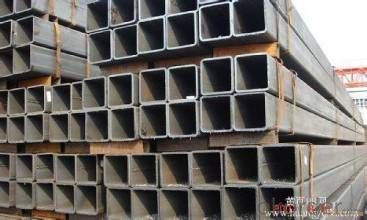
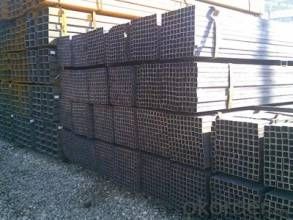
- Q: How do you determine the required support spacing for steel pipes?
- Various factors, including the diameter of the pipe, the strength of the material, the operating conditions, and local building codes and regulations, determine the required support spacing for steel pipes. When considering the diameter of the pipe, it is crucial to note that larger pipes generally need more frequent support to prevent excessive deflection and sagging compared to smaller pipes. The strength of the material is also a significant consideration, as pipes with greater strength can span longer distances without requiring additional support. The operating conditions of the pipe, such as the type of fluid being transported and the temperature, also play a role in determining the necessary support spacing. For instance, pipes carrying heavy or corrosive fluids may require more frequent support to prevent excessive stress and potential failure. Local building codes and regulations often provide specific guidelines for the minimum support spacing of steel pipes. These regulations take into account factors such as the diameter of the pipe, the strength of the material, the operating conditions, as well as safety and structural requirements. To accurately determine the required support spacing for steel pipes, it is essential to consult relevant codes, standards, and engineering guidelines. Additionally, working with qualified engineers and professionals experienced in pipe design and installation will ensure that the support spacing meets all necessary requirements, ensuring the safe and efficient operation of the piping system.
- Q: How are steel pipes marked for identification and traceability?
- Various methods are utilized to mark and trace steel pipes for identification purposes. One prevalent technique involves the use of permanent markers or paint. These markings typically encompass vital information such as the manufacturer's name or logo, the pipe's dimensions and specifications, and the production date or batch number. Aside from surface marking, steel pipes may also be identified through the utilization of tags or labels. These tags are commonly constructed from durable materials such as metal or plastic and are securely affixed to the pipe. They entail comprehensive details regarding the pipe, including its unique identification number, material composition, and any pertinent certifications or standards it adheres to. Another method employed for identification and traceability encompasses the application of barcodes or QR codes. These codes can be scanned using specialized equipment or mobile applications, instantly granting access to comprehensive information concerning the pipe's origin, production process, and quality control measures. Barcodes and QR codes offer a more efficient and automated means of monitoring and tracing steel pipes throughout their lifespan. Moreover, some steel pipes may feature embossed or engraved markings directly on their surface. These markings are typically etched into the metal and possess the ability to withstand harsh conditions, ensuring long-term visibility and legibility. The ultimate objective of marking steel pipes is to guarantee their accurate identification and traceability throughout their lifespan. This aids in quality control, maintenance, and inspection procedures, as well as ensuring compliance with regulatory requirements. Clear and permanent markings enable manufacturers, suppliers, and users to effortlessly track and trace the history and specifications of steel pipes, facilitating better management and accountability in diverse industries such as construction, oil and gas, and infrastructure development.
- Q: Could you tell me what difference between SC galvanized steel pipe and MT wire pipe?
- SC is welded pipe, not galvanized pipe, RC is galvanized pipe, MT is lined pipe laying
- Q: How are steel pipes protected against fire hazards?
- Steel pipes are protected against fire hazards through various methods, including the application of fire-resistant coatings, encasement in fire-rated materials, and the installation of fire sprinkler systems. Additionally, fire stops and fire barriers are used to prevent the spread of fire and smoke through pipe penetrations in walls and floors.
- Q: How do you calculate the buoyancy of submerged steel pipes?
- To calculate the buoyancy of submerged steel pipes, you need to determine the weight of the displaced fluid. This can be done by multiplying the volume of the submerged portion of the pipe by the density of the fluid. The buoyant force is then equal to the weight of the displaced fluid.
- Q: How are steel pipes used in the telecommunications sector?
- Various purposes in the telecommunications sector commonly make use of steel pipes. Conduit for underground cable installations is the first purpose served by steel pipes. These pipes ensure the safety of fiber optic cables, which carry data and voice signals over long distances, by providing protection and support. The sturdy nature of steel pipes guarantees that the cables remain secure from external factors like moisture, rodents, and accidental damage. Furthermore, the construction of telecommunication towers and masts involves the use of steel pipes. A strong and durable material is required to bear the weight of antennas, transmitters, and other equipment in these structures. For this purpose, steel pipes are ideal due to their high tensile strength and resistance to harsh weather conditions. Additionally, steel pipes are utilized in the installation of overhead communication lines. These lines are often suspended between poles or towers, and steel pipes serve as supports or brackets to hold the cables in place. The corrosion-resistant properties of steel make it a reliable choice for outdoor installations exposed to various elements. In conclusion, steel pipes play a critical role in the telecommunications sector. They provide protection, support, and durability to cable installations, tower constructions, and overhead communication lines. Their strength and resistance to environmental factors make them an essential component in the establishment and maintenance of reliable telecommunications networks.
- Q: How do you prevent corrosion in steel pipes?
- One effective way to prevent corrosion in steel pipes is by applying a protective coating, such as paint or epoxy, to the surface of the pipes. This barrier creates a physical barrier between the pipe and the surrounding environment, preventing moisture and corrosive agents from coming into direct contact with the steel. Additionally, regular inspection and maintenance of the pipes, including cleaning and repairing any damaged coating, can help identify and address potential issues before they lead to corrosion.
- Q: What is the difference between steel pipes and fiberglass pipes?
- The main difference between steel pipes and fiberglass pipes lies in their composition and properties. Steel pipes are made of metal and are known for their strength, durability, and resistance to high temperatures and pressure. They are commonly used in industrial settings and for transporting liquids and gases. On the other hand, fiberglass pipes are made of glass fibers embedded in a resin matrix, providing them with excellent corrosion resistance, lightweight properties, and insulation capabilities. Fiberglass pipes are often used in applications where corrosion is a concern, such as in chemical processing plants or wastewater treatment facilities.
- Q: Seamless steel pipe and welded pipe what is the difference?
- Identification method: see the inside of the pipe, because the external, will deal with the welded pipe is inside a gap, you can see some, some, is not easy to see, you can slowly by hand touch, or see the specifications are relatively thin, welded pipe
- Q: How are steel pipes used in the manufacturing of geothermal systems?
- Steel pipes are used in the manufacturing of geothermal systems for their durability and heat conductivity. They are used to transport fluids, such as water or steam, between the geothermal source and the heat pump or power generator. Steel pipes can withstand high temperatures and pressures, making them ideal for the harsh environment of geothermal systems. Additionally, their corrosion resistance ensures the longevity and efficiency of the system.
Send your message to us
Rectangular Hot Rolled Steel Pipe
- Loading Port:
- China Main Port
- Payment Terms:
- TT or LC
- Min Order Qty:
- -
- Supply Capability:
- -
OKorder Service Pledge
OKorder Financial Service
Similar products
Hot products
Hot Searches
Related keywords
